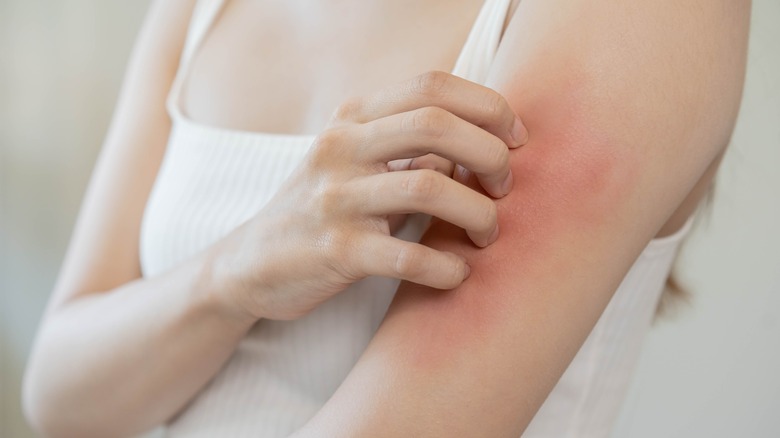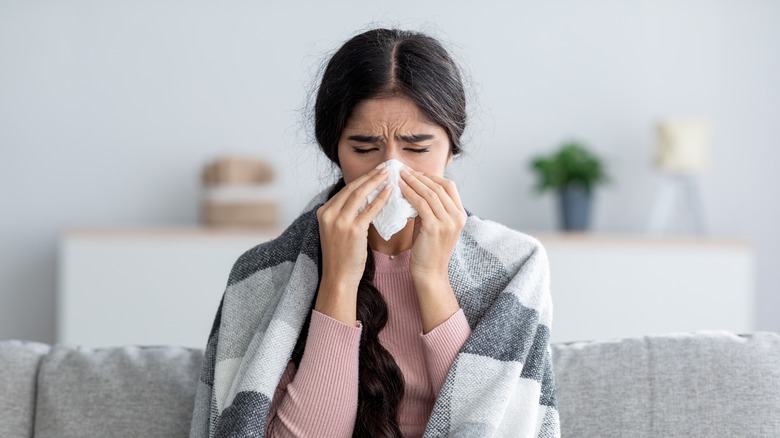What It Really Means When You Itch While Taking Medication
Do you itch while taking drugs? Many causes can account for this, including your body's allergic reaction to the drug. According to Mayo Clinic, people can experience allergic reactions to any medication. However, the symptoms can differ for every patient and may include itching, a runny nose, and wheezing. These symptoms aren't necessarily side effects of the drugs. Drug allergies occur when the immune system mistakes a drug for a harmful virus or bacterium (via Mayo Clinic). These harmful substances can be grouped as antigens, which are alien to your body's natural makeup (via Healthline).
After contact with the harmful substance, the immune system naturally develops antibodies as a defense mechanism. These antibodies are proteins that bind to unwanted substances to eliminate the harmful substances from your system (via Cleveland Clinic). The body's immune system releases antibodies into the bloodstream, which trigger the release of histamines from the white blood cells, causing symptoms like itching, per Healthline.
Medline Plus notes that a drug allergy differs from a medication's side effects, often listed on the label — which don't normally involve the immune system. When in doubt, it's best to have a word with your doctor to properly understand what causes you to itch while taking medication.
Symptoms of a medication allergy
Even though various medicines can trigger a drug allergy, some are more likely than others. WebMD notes that some common drugs include chemotherapy drugs, antibiotics like amoxicillin, HIV drugs, insulin, etc. Drug allergy symptoms can range from skin rashes to swelling and fevers (via Mayo Clinic). The source also warns that drug allergies can be life-threatening, especially when experiencing anaphylaxis, which can affect multiple body systems. Anaphylaxis usually happens suddenly, occurring within minutes after taking the drug. Furthermore, you may experience symptoms like irregular heartbeat, breathing troubles, or unconsciousness. According to Mayo Clinic, it's a medical emergency that can lead to anaphylactic shock, which can be fatal.
However, not every drug allergy is serious and demands critical attention. Some start with mild symptoms. The main danger is that you may not know when a drug allergy will escalate. And often, many people may downplay the symptoms first-hand, expecting it not to last long. Just like every unknown allergic reaction, you may want to monitor for worsening symptoms and report to your doctor as soon as possible. However, don't hesitate to call 911 if you experience signs of a severe reaction or suspected anaphylaxis after taking a medication.
Treatment options for itching due to medication allergy
If you feel you have a drug allergy, please visit your doctor for a diagnosis. Typically, treatment for a drug allergy begins with treating symptoms when they first emerge and discontinuing the drug, per Mayo Clinic. Common treatment options include antihistamines, corticosteroids, and bronchodilators (via Healthline). Antihistamines curb the production of histamine, which, as mentioned earlier, is the chemical created by your immune system when it detects allergens (via Cleveland Clinic). This treatment can come in pills, eye drops, creams, or sprays.
Likewise, corticosteroids are also administered similarly to antihistamines, but liquid options are also available for patients to use as inhalers. In addition, this treatment can be administered through injections or nebulizers. Another treatment option includes the use of a bronchodilator. Bronchodilators can help expand your airways to facilitate breathing. This option is ideal if your drug allergy symptoms include coughing or wheezing (via Healthline). Just like corticosteroids, they can also be dispensed in liquid form when using an inhaler.



